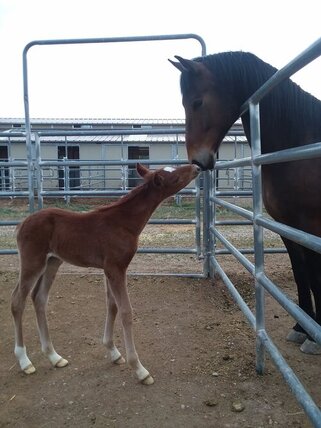 We live in a world where a “papered” horse is a good horse, where recognizable names on a pedigree can add thousands of dollars to a purchase price, and bloodlines are a ticket to a life of greatness. But could we be formulating the outcome of a horse’s life based on our thoughts and not on its actual ability? Can you place the same expectations on a no-name grade horse with decent conformation and get similar results? That is proving to be more and more true. Every horse is bred for success given the right opportunity. Take the famous Snowman for example. A former plow horse plucked out of a truck headed to slaughter and went on to be top Open Jumper in the United States two years in a row in the 1950s. More recently, a three-strike mustang named Cobra has won a World Championship in USEF Western Dressage. This isn’t just dumb luck. These horses were fortunate enough to have ended up in the hands of humans who offered them opportunity. When we work with our horses, it’s important not to set them up for failure with pre-conceived notions, such as “Hancock bred horses are stubborn”, or “blue-eyed paints are crazy”. These stereotypes will set you up to receive what you expect. It will cause you to treat that horse in a way that is hasn’t deserved, and could possibly lead to behaviors you are trying to avoid. Instead, if we really listen to the horse and let us know where it’s sensitivities are, we will get to its potential much faster. Why do so many horses end up in slaughter or in dire situations? I believe it is because they weren’t given the opportunities to be valuable to the humans responsible. Think about that when you come across a reactive horse who wasn’t given patience, or a dull horse who has shut down from being beat on and not knowing what to do to relieve the pain. Proper training is the best method of developing a good-minded horse. Why are we blaming these horses when we should be blaming their history? Give that horse a chance and you won’t be disappointed. KATHERINE JOHANSONAPRIL 28, 2020
0 Comments
Leave a Reply. |
AuthorTrainers and mustang owners sharing their experiences and insights about mustangs. Archives
November 2022
Categories
|
 RSS Feed
RSS Feed